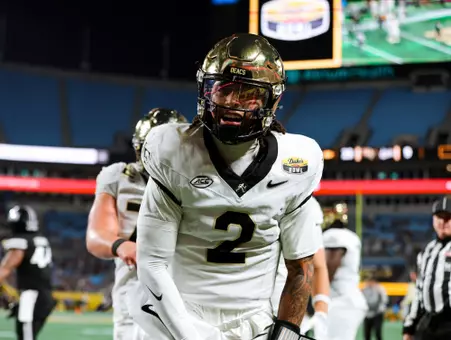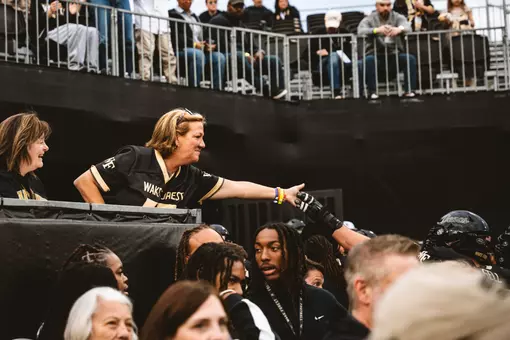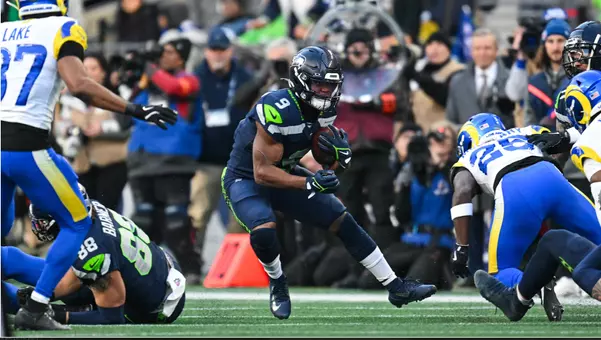Wake Forest Athletics
King Perseveres To Become One Of ACC's Elite
11/3/2003 12:00:00 AM | Football
Nov. 3, 2003
Eric King can identify two turning points in his young life that have helped to make him the man he is today. The junior cornerback is in the midst of an All-ACC caliber season and has established himself as one of the best defensive backs in the league. King, who labels himself as confident but not cocky, always believed he would get where he wanted to go in life. But he hasn't reached his destinations without experiencing setbacks and travails - life's little lessons that makes one grow. So in King's mind, the measure of a man can be seen through his ability to persevere.
Although you wouldn't know it by watching him running on the field today, King had asthma as a child. At that time of his life, he already knew he loved playing sports. Doctors encouraged him to be as active as possible to help him overcome the disease with the hope that he would grow out of it. In most cases, when asthma is caused by infections rather than allergies, children tend to grow out of the disease by adolescence, which is what happened with King.
But King said it wasn't a childhood disease that he would define as one of his two turning points. Rather a decision he made before his freshman year of high school and an injury that took away almost his entire junior season of high school developed his ability to persevere. Perhaps he already had the genetics to overcome his obstacles, or maybe it is just his competitive nature.
"I'm very competitive," King said. "If you asked the coaches or my teammates, they'll tell you I have that driven attitude and determination. I always want to come out on top. I think I get that from my dad." King probably gets more than just his competitive nature from his father. Eric King Sr. played professional basketball in Venezuela, and although Eric Jr. grew up playing basketball, both he and his father realized that football should be the focus of his athletic future.. His mother, Deborah Murray, is an inner-city middle school principal in Baltimore, Md., and King says he inherited confidence and determination from her. "She's a pretty tough lady, and I look up to my mom a lot." Although his parents separated when King was still in elementary school, he has always had the support and presence of both his parents.
Growing up in a suburb of Baltimore, King's ability to make choices between right and wrong were tested early and often. By the time he reached middle school, his parents confronted him with the possibility of leaving the public school system in which he had grown up to attend a private school where he would more challenged academically and still able to play the sports he loved. "Where I'm from in Maryland, it could get rough at times," King said. "So in order to be all I wanted to be in sports and to make it to college I had to go to a private school. I think it was a tougher decision on me (than my parents) because I didn't want to leave my friends. Now that I look back, it was best I left behind some of those knucklehead friends. Even when I go home now some of those people are doing those same things, and I'm so far beyond that with goals I'm trying to reach. So private school was best for me in that way.
"Honestly I think that was a big turning point in my life. The fact that I was able to step away from going to a public school to be with all my friends, a school that wasn't as intense with school work, and to put academics and my goals in front of me has helped me be here playing Division I football. Ever since I was playing Pop Warner, I knew I wanted to be a Division I college football player. Although I knew how my mom felt about it, and my dad thought it was the best decision for me, they left it upon me to make the decision. They felt I would make the right decision as long as they gave me good advice."
King attended the McDonogh School, a private co-education school in Owings Mills, Md. There he earned first team all-state, all-metro and all-county honors in football and was part of three conference championships in football and three in basketball. In the classroom, he was an honors student. King's life was going as planned until just before his junior season. King was undercut while playing basketball and seriously separated his shoulder. He underwent arthroscopic surgery to reattach a tendon and repair the shoulder. As a result, he missed the majority of his junior football season. At the time, it seemed to be the worst possible thing that could happen.
"I knew my junior year was a big year to get recruited by colleges," King said. "It set me back a little bit, made me realize the academics were important as well. It definitely made me a mature person."
King seemed to fall victim to the adage, you never know what you've got until it's gone. Not being able to play hit him hard, but Sean Kribel and Dominic Damico, two of Kings high school coaches, helped him get through the frustration of the injury. "Coach Damico assured me that he would still help me get recruited and told me he still thought I was a good player. Sean Kribel really just took me under his wing and helped me out with my academics and just helped me with a lot of different things in life." Although King was a good student, he still had one more obstacle to overcome before he could realize his dream of playing major college football. King wasn't academically eligible when he graduated from the McDonogh School, and the interest of many of the colleges that had recruited him waned. He spent one semester at Hill School, a prep school in Pottstown, Pa., to take care of his academic situation before transferring to Wake Forest, one of only a couple of universities that kept its interest in King as a player.
King has made the most of his opportunities since reaching Wake Forest.
A third-year starter and solid All-ACC candidate, King has 28 consecutive starts, which presently ranks fourth on the team. With four pass break-ups against Florida State, King grabbed the ACC lead in passes defended with 15 and has 13 pass break-ups and two interceptions. He ranks second in the ACC in fumbles forced and third in fumbles recovered. King already ranks fifth on Wake's career pass break-up list with four games left to play this season and a senior campaign awaiting him in 2004. It's almost inevitable that he'll be one of the best corners to ever play at Wake Forest. While some are surprised by King's emergence in his junior season, this is exactly what he expected.
"It may be a surprise to others, but I've just worked hard all my life and I feel I can do better that what I'm doing now," King said. "I have no problems taking over a leadership role because it's something I can do. I just want to do what best to help us win games."
He respects his opponent no matter their name or team affiliation and plays them all the same. Although he is just 5-9 and often plays against taller receivers, he has a 35-inch vertical jump and a knack for being in position to separate a receiver from the ball. "It really doesn't matter who is across from you," King said. "Some are big and fast, some are smaller and quicker, but they're all fast. They all bring different dimensions to the game.
"My height would probably be the one knock on me, but I guess I make up for it with my playmaking ability. A lot of it is just timing and experience. I know how to judge how and where people want to catch the ball. What a lot of people don't realize is when you throw to a taller receiver they still have to come down with the ball. I do a lot of poking the ball out when they come down or try to bring it in. If I'm not up there with them then I've got to find a way to knock it out."
He worked out hard in the offseason with a group of defensive backs defending teammates like Jason Anderson and Anthony Young one-on-one on every pass route imaginable. He worked on everything from posts to hitches and double moves. He says he's seen every move there can possibly be and went up daily against Chris Davis' speed and the height of Jason Anderson and Anthony Young, teammates who could test King's skills.
"He's just a guy we've got to have out on the field and he's got the stats to show that," said Keith Henry, King's position coach. "He's been an every play player, been a little banged up but plays hurt. The thing I love about him is he's a fireball right now, and he's going to play at the highest level and wants to win. I only take him off the field if he needs a blow, and he plays on kickoff and punt block as well. He knows the game real well and does things on the field you can't coach. He's just an all-around player and great kid. And the thing about Eric is he doesn't care who gets the credit." No one is immune to the trials of life, but it's the choices one makes in handling them that proves character. King is living proof that no matter what the situation, no matter the detour, one can eventually get where they want to go. "One thing I've learned from Coach (Jim) Grobe and about life in general is that you have to play through pain sometimes," King said. "You have to do things under circumstances that may not be the greatest and everything may not be all in place. But you have to work through adversity." Perhaps Grobe puts a different spin on it, but how to play and live through adversity seems to be something King already well understood.



